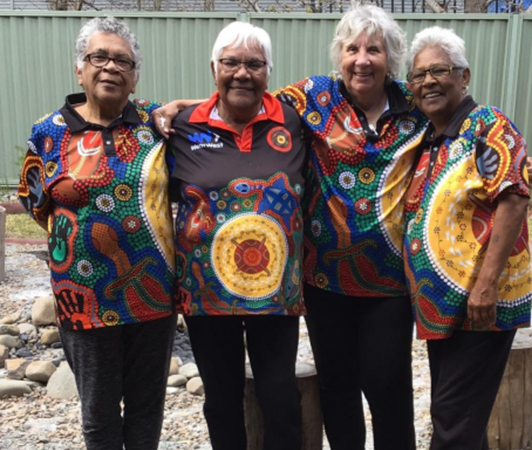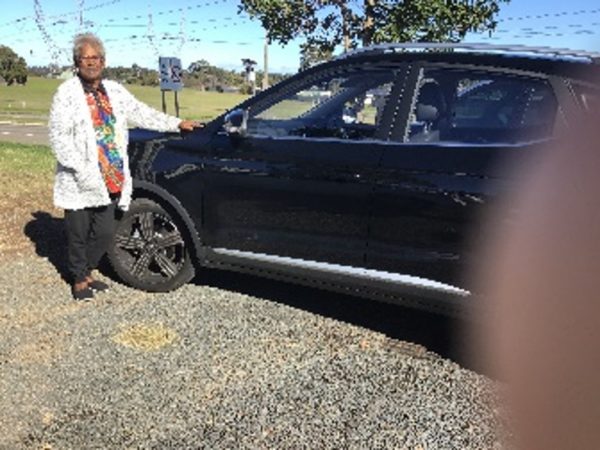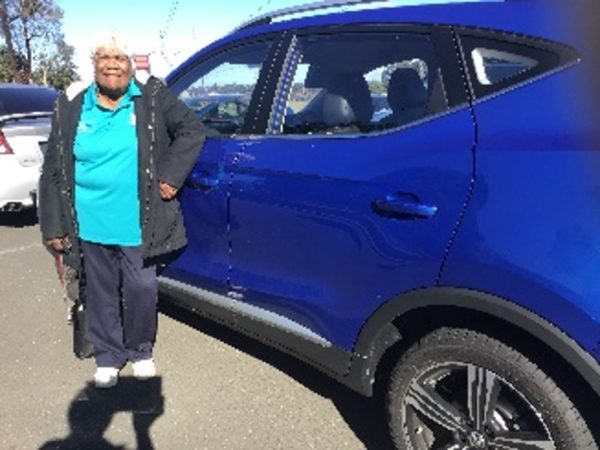Supporting Aboriginal community healing in Western Sydney
“How can we offer comfort and ease the pain of trauma when it’s so woven into your soul?”[1]
Healing for Indigenous Peoples of Australia is a community affair. It is a weaving of connections that might begin in the individual body and mind but radiates outward to family and community—to the whole circle. These communities are dealing with the legacy of colonization and with continued racism and marginalization. Chronic disease, mental illness and addiction, troubled family relationships, and a loss of cultural identity are symptoms of this generational trauma. This dislocation is especially acute in urban centers like Western Sydney, where Aboriginal peoples are distanced from ties of kinship and land. It is therefore even more important here to revive the connections that heal.
[1] From a conversation on intergenerational trauma among Aboriginal community leaders Uncle Albert Hartnett, Shekara Hartnett, and Cassandra Ebsworth, Community Liaison and Support Worker, Baabayn Aboriginal Corporation, as recorded in The Activist Practitioner Issue No.5, August 2021, 17.
Helping Aboriginal people heal in body and spirit
Two Western Sydney nonprofits offer local Aboriginal and Torres Strait Islander individuals the support they need to heal from the trauma of colonization and racism. Those needs are diverse, with the damage woven generation upon generation into souls. Resources range from primary medical care to a place to gather in a circle and “have a yarn,” or share stories and knowledge that together form a cultural tapestry.
Baabayn Aboriginal Corporation was founded a decade ago by five Aboriginal Elders from Western Sydney to provide a place of healing, where Aboriginal people can connect with culture and build a sense of belonging. Founding member Aunty Janice Brown from Nambucca named the organization ”Baabayn” after the Gumbaynggirrr word meaning “ancestral women.” Baabayn provides care, services, and support to help individuals and families recover from past trauma, regain their self-esteem, and realize their potential. Baabayn director Aunty Margaret Farrell, a Bundjalung Elder, explains, “The success of Baabayn and why people keep coming back is that they feel welcomed. Baabayn is a healing center, and no one feels that they have to prove themselves. Everyone who comes through the door has had past injustice and we know that it’s continuing today.”
Greater Western Aboriginal Health Service (GWAHS) is a 30-year-old Aboriginal community-controlled health service comprising three clinics in Western Sydney. GWAHS offers services ranging from primary healthcare to specialist programs focused on chronic disease, maternal health, child and family services, men’s health, addiction and recovery support, and mental healthcare.
Both Baabayn and GWAHS envision their care as proceeding outward from the individual to the family and to the whole community. “You come to Baabayn and it helps you as an individual. That flows back into your family, which flows back into you, and it flows into the community, which also flows back into you,” explains Elder Aunty Pat Fields.
“Baabayn is a healing center, and no one feels that they have to prove themselves. Everyone who comes through the door has had past injustice and we know that it’s continuing today.”Aunty Margaret Farrell, Bundjalung Elder and Baabayn Director
Sustaining the healing circle through a pandemic
Microsoft is honored to be part of this circle of healing with donations to both Baabayn and GWAHS. Since gathering in person is such a critical part of both organizations’ missions, the funds largely went to supporting the facilities’ safe reopening through improved pandemic-level hygiene.
COVID-19 presents a particular risk to many in these communities. Infections are higher and the vaccination rate lower than the state-wide average. Protecting the community from exposure to the virus is therefore a first-order priority. Increased hygiene not only ensures the safe accessibility of healing services, but also creates jobs for local Indigenous individuals.
Baabayn was able to open safely after the initial lockdown—and stay open—by creating a more thorough cleaning protocol. The funds from Microsoft created cleaning jobs for local Indigenous people, two of them Aboriginal and one Maori. The benefit of the funds was thus twofold; as a Baabayn volunteer explains, “Part of the story is employment for Aboriginal people, which in itself is quite a big deal in our neck of the woods, but the more significant part is that our Centre became an important part of the lives of more and more people as the first wave of COVID infections receded. We experienced major growth in our program for young mothers and their preschool children.”
Perhaps most important is the community healing Baabayn makes possible by holding space for people to gather and share stories. “We have counselors who come in if the women feel they need to talk and we don’t judge. The women are not pressured to say anything, but when we are in a group and all sitting around and having a cup of tea, they all tell their story in their own time. No one talks over anyone because everyone has experienced trauma in their life,” explains Aunty Margaret. “The donation from Microsoft has made all this good experience possible. Above all, it is the feeling of welcome and belonging that means so much to people who have experienced marginalization all their lives,” reflects a Baabayn volunteer.
In addition, Microsoft funding helped purchase vehicles for two of Baabayn’s directors, Aunty Jenny Ebsworth, a Murrawarri and Ngemba Elder, and Aunty Margaret Farrell. The vehicles give the directors the mobility they need to fulfill their role as community leaders—for example, attending meetings and other functions, and performing acknowledgements of country.
GWAHS also used Microsoft funding to keep its centers safe and accessible throughout COVID-19 lockdown and beyond. The health clinics shifted to digital screening for non-urgent primary healthcare via telehealth and direct prescription management with local pharmacies. But most importantly, the funds have helped the clinics reopen as quickly and safely as possible. During the lockdown, the donation was used for personal protective equipment to protect staff and clients. With reopening, the funds have been used to hire additional staff for screening checkpoints and more thorough cleaning in common rooms and in exam rooms between each patient.
In addition, the funds went to improved healthcare for the staff, including vitamins and fresh fruit. As a testament to the success of all these measures, no staff has ever tested positive and the clinics have only had to shut down twice, for no more than a day.
“Bringing you home…”
Health is a delicate balance of body, mind, and soul. This is especially true for communities dealing with the legacy of colonization and continued racism. Healing is a reweaving of erased cultural identity and dislocation that might begin with the individual body but radiates outward to family and community circles.
As Aboriginal-led institutions, both Baabayn and GWAHS recognize that health goes beyond medical care. A Baabayn Elder explains, “The Aboriginal way looks at the history of a problem… the disconnection of the spirit and loss of belonging.” Community practices like yarning create a circle of healing. Cassandra Ebsworth, Community Liaison and Support Worker for Baabayn, reflects, “Growing up in the bush and surrounded by all of that knowledge and the wisdom of our elders, Baabayn has all of that and it takes you back to the bush when you can sit around and have them deadly yarns. Just being there, you don’t really have to say anything. When one of the Aunties or the elders are talking, you feel that ‘bringing you home’ feeling.”
Microsoft is honored to help foster these moments of connection in any way we can, in line with our commitment to supporting the communities in which our datacenters are located.




